

Assignment 2 Gallery Walk (530/Fall 2020) Search/Information World Blogs (not all of these focus consistently on search!) Week 14: Future of Search (*=Key reading) How to search repositories - Repositories: scholarly research, free online - LibGuides at Sotheby's Institute of Art. Very little repository content can be found with Summon (SIA's search engine).
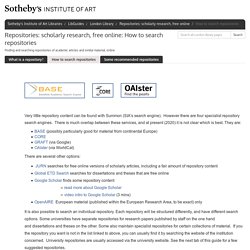
However there are four specialist repository search engines. GoogleCheatSheet. Week 10CredibilityAuthorityEvaluation - Presentaciones de Google. Infographic: Beyond Fake News – 10 Types of Misleading News – Seventeen Languages. The work needed to effectively filter information in our media-saturated environment takes time and skill.
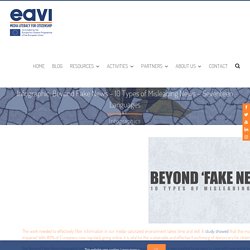
A study showed that the more content we consume, the more our ability to make decisions about its veracity becomes impaired. With 80% of Europeans now regularly going online, it is vital for the sustainable and effective functioning of democracy for citizens to be able to curate their media diets with a healthy critical eye. Our Beyond Fake News infographic identifies the 10 types of potentially misleading news. It was created to be used in class with real-world examples to spark classroom debate and reflection on the ways that media is constructed. We hesitated to put the term ‘fake news’ in the title of the infographic as, ironically, the term itself is a misleading simplification. Below this article, you will find a pdf version of the infographic as well as a dropdown list containing some resources for teaching the 10 Types of Misleading News.
The 10 types. Teaching Digital Literacy. Presented by Michelle Luhtala, Head Librarian, New Canaan High School, CT; and Joyce Valenza, Assistant Teaching Professor, Rutgers University, MI Program Sponsored by Mackin Educational Resources If you attended the live session, you’ll be emailed a CE certificate within 24 hours of the webinar.
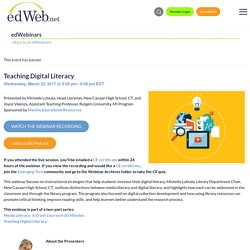
If you view the recording and would like a CE certificate, join the Emerging Tech community and go to the Webinar Archives folder to take the CE quiz. This webinar focuses on instructional strategies that help students increase their digital literacy. Michelle Luhtala, Library Department Chair, New Canaan High School, CT, outlines distinctions between media literacy and digital literacy, and highlights how each can be addressed in the classroom and through the library program.
The program also focused on digital collection development and how using library resources can promote critical thinking, improve reading skills, and help learners better understand the research process. Download here. Current events analysis. Evaluative, Annotated Works Cited. HongKong: Beyond the Checklist - Presentaciones de Google. Week 10: Credibility Assessment Toolkit. Week 10: Credibility/Authority (*=Key reading) Curation Platforms Toolkit. Week 8: Portals, Directories, the Deep & Dark Web (*=Key reading) Intellectual property/ethics: Creative Commons, Copyright, Fair Use, Public Domain, CC0. CC0 Image Portals (and liberally licenced image portals) Power Searching with Google - Course. How to Spot a Fake.
Advanced Power Searching. Challenge Introduction Challenges are opportunities for you to learn and practice Advanced Search skills.
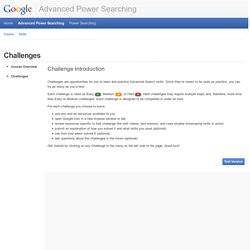
Since they’re meant to be used as practice, you can try as many as you’d like! Each challenge is rated as Easy E, Medium M, or Hard H. Hard challenges may require multiple steps and, therefore, more time than Easy or Medium challenges. Each challenge is designed to be completed in under an hour. For each challenge you choose to solve: use any and all resources available to you open Google.com in a new browser window or tab review resources specific to that challenge like skill videos, text lessons, and case studies showcasing skills in action submit an explanation of how you solved it and what skills you used (optional) see how your peers solved it (optional) ask questions about the challenges in the forum (optional) Get started by clicking on any Challenge in the menu on the left side of the page.
‘We Must Go Deeper … ’ In the movie Inception, the main character keeps goading his team further into the subconscious mind, saying “We must go deeper.”
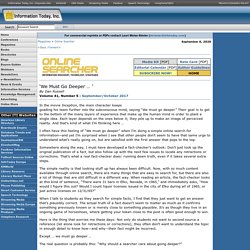
Their goal is to get to the bottom of the many layers of experience that make up the human mind in order to plant a single idea. Each layer depends on the ones below it; they pile up to make an image of perceived reality. And that’s kind of what I’m thinking here … I often have this feeling of “We must go deeper” when I’m doing a simple online search for information—and yet I’m surprised when I see that other people don’t seem to have that same urge to understand what’s really going on, but are satisfied with the first answer that pops to the top. Somewhere along the way, I must have developed a fact-checker’s outlook: Don’t just look up the original publication of a fact, but also follow up with the next few issues to locate any retractions or corrections. The simple reality is that looking stuff up has always been difficult. Except … we must go deeper … Librarianship is a Technical Profession…That is All About People – R. David Lankes. [This is an edited version of the script I used for my talk.
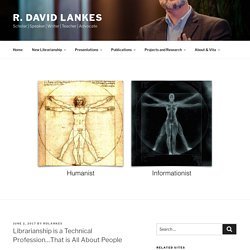
However, it is not a word for word transcript.